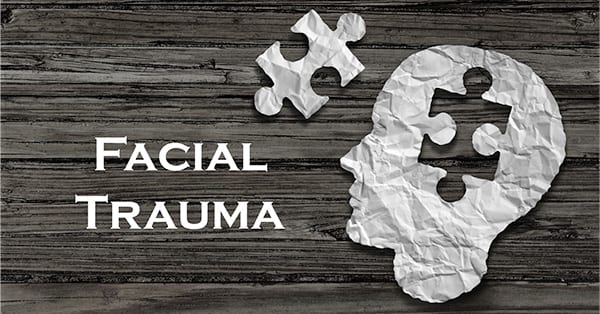 Facial trauma, or injuries to the face, can range from broken teeth to extremely severe injuries of the skin and bones of the face. The goals of treating facial injuries includes creating a clear airway, controlling bleeding, fixing broken bone segments and treating fractures, preventing scarring if possible, and ruling out other injuries. Facial injuries can be either soft tissue injuries, which damage the skin or gums, or bone injuries, the result of breaks or fractures. Facial injury can also cause dental structure damage.
Facial trauma, or injuries to the face, can range from broken teeth to extremely severe injuries of the skin and bones of the face. The goals of treating facial injuries includes creating a clear airway, controlling bleeding, fixing broken bone segments and treating fractures, preventing scarring if possible, and ruling out other injuries. Facial injuries can be either soft tissue injuries, which damage the skin or gums, or bone injuries, the result of breaks or fractures. Facial injury can also cause dental structure damage.
Soft Tissue Injury Treatments
Soft tissue injuries include lacerations, burns, and bruises. Suturing often repairs lacerations on the face. Doctors inspect soft tissue injuries for other more serious injuries and often consider the care that yields the best cosmetic result possible.
Bone Injury Treatments
Fractures of face bones are treated the same way as fractures in other parts of the body. The treatment is usually determined by the location of the fracture, the severity, the age, and general health of the patient. Since a cast cannot be placed on the face, other options have to be considered to stabilize facial fractures.
One option is wiring the jaws together for certain fractures of the upper and/or lower jaw. Other types of fractures are best treated and stabilized by “rigid fixation” of a fracture – the surgical placement of small plates and screws – which can often allow for healing and prevents having to wire the jaws together. Rigid fixation can improve the recovery period for many patients. Cosmetic considerations can be minimally affected through fewer and smaller incisions placed where the scar is hidden.
Dental Structures Injury Treatments
Injuries to teeth are quite common, and often require the expertise of various dental specialists. Oral surgeons treat fractures and replant teeth. If a tooth is knocked out, place it in salt water or milk and do not wipe it off. The sooner the tooth is re-inserted into the dental socket, the better chance it will survive. With teeth injuries, the patient should see a oral surgeon as soon as possible. If you can’t save the injured teeth or they are beyond repair, dental implants may be a good choice.
Many patients with facial injuries are first seen in the emergency room, and then referred to an oral and maxillofacial surgeon. Severe facial trauma can prevent the passage of air, cause a concussion, or a more serious brain injury. Seek medical help immediately for severe facial trauma. Once you are out of immediate harm, contact an experienced oral surgeon who can help you recover your smile. The experts at Oral and Maxillofacial Surgery of Nashville can help.
The information and content on our website should not be used as a substitute for medical treatment or advice from your doctor.









